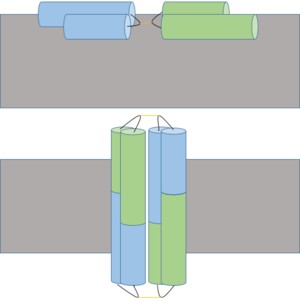We apologize for Proteopedia being slow to respond. For the past two years, a new implementation of Proteopedia has been being built. Soon, it will replace this 18-year old system. All existing content will be moved to the new system at a date that will be announced here.
Sandbox Reserved 996
From Proteopedia
(Difference between revisions)
| Line 27: | Line 27: | ||
== Toxicology == | == Toxicology == | ||
| - | Ectatomin is one of the deadliest proteins known to man, alongside [https://en.wikipedia.org/wiki/Tetanospasmin Tetanospasmin] and the [https://en.wikipedia.org/wiki/Botulinum_toxin Botulinum toxin]. | + | With an LD<sub>50</sub> of 6.8 μg kg<sup>-1</sup>, Ectatomin is one of the deadliest proteins known to man, alongside [https://en.wikipedia.org/wiki/Tetanospasmin Tetanospasmin] and the [https://en.wikipedia.org/wiki/Botulinum_toxin Botulinum toxin].<ref name="reftwo" /> Ectatomin attacks and forms pores in the plasma membrane, allowing cations to freely move in and out of the cell. The primary cations which flow through the pore are Ca<sup>2+</sup> and K<sup>+</sup>. . As the concentrations on either side of the cell reach equilibrium, the cells and the person effected with the toxin dies. The major cations effected is the calcium ion. Without the calcium gradient the muscles are not able to contract leaving the effected person paralyzed. Another major worry with free flowing cations reaching equilibrium is with potassium. Without a potassium gradient the heart will not be able to contract/beat leaving the person unable to push oxygen and nutrients throughout the body and to the brain. |
Revision as of 00:48, 11 March 2015
Ectatomin (1eci)
| |||||||||||
References
- ↑ 1.0 1.1 1.2 1.3 Arseniev AS, Pluzhnikov KA, Nolde DE, Sobol AG, Torgov MYu, Sukhanov SV, Grishin EV. Toxic principle of selva ant venom is a pore-forming protein transformer. FEBS Lett. 1994 Jun 27;347(2-3):112-6. PMID:8033986
- ↑ 2.0 2.1 2.2 2.3 Pluzhnikov K, Nosyreva E, Shevchenko L, Kokoz Y, Schmalz D, Hucho F, Grishin E. Analysis of ectatomin action on cell membranes. Eur J Biochem. 1999 Jun;262(2):501-6. PMID:10336635
- ↑ 3.0 3.1 3.2 3.3 3.4 3.5 Nolde DE, Sobol AG, Pluzhnikov KA, Grishin EV, Arseniev AS. Three-dimensional structure of ectatomin from Ectatomma tuberculatum ant venom. J Biomol NMR. 1995 Jan;5(1):1-13. PMID:7881269
- ↑ 4.0 4.1 Touchard A, Labriere N, Roux O, Petitclerc F, Orivel J, Escoubas P, Koh JM, Nicholson GM, Dejean A. Venom toxicity and composition in three Pseudomyrmex ant species having different nesting modes. Toxicon. 2014 Sep;88:67-76. doi: 10.1016/j.toxicon.2014.05.022. Epub 2014 Jun 11. PMID:24929139 doi:http://dx.doi.org/10.1016/j.toxicon.2014.05.022

